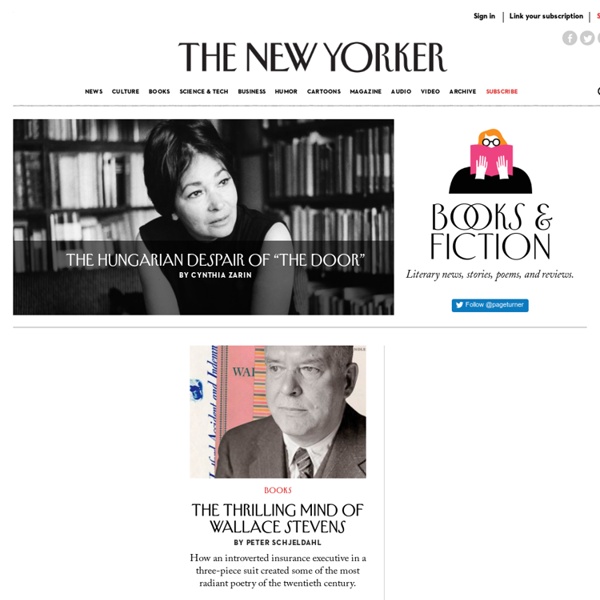NoveList | EBSCOhost
Latest News & Events Latest Articles Technology & Services Discovery & Services Publisher Services ppf Subscription Fulfillment Content Research Databases Magazines, Books & Journals Readers' Advisory NoveList Medical Resources Skills Development Interact Blogs
ROAR Magazine | A Journal of the Literary Arts by Women
Marjana Gaponenko: Das letzte Rennen - Komisch, skurril, voller unerhörter Begebenheiten
"In den letzten Jahren wurde mir bewusst, dass ich das praktische Wissen, dass ich mir auf dem Gebiet der Pferdekommunikation, des Wagenbaus und des Gespannfahrens angeeignet habe, unbedingt in meinen nächsten Roman münden lassen müsste. Das ist jetzt geschehen, und ich bin selbst überrascht, dass die Kutschen und Pferde ein bisschen auf der Strecke geblieben sind und dass es eher teilweise eine lustige Horrorgeschichte geworden ist, für mich zumindest. Diese Kulisse finde ich sehr spannend, Behinderung und Tod, mitten im Luxus, so eine scharfe Suppe habe ich noch nicht zuvor gebraut." Scharfe Suppe mit vielen Zutaten Die scharfe Suppe, die Marjana Gaponenko angerührt hat, hat viele Ingredienzien: eine alte Pferderennbahn, Pferderassen und Pferdegeschirre, halsbrecherische Kutschfahrten, einen alten polnischen Pferdenarren, Adam Nieć, der mit Kutschpferden sein Alter genießt und sein Sohn Kaspar, für den diese Leidenschaft zum Verhängnis wird. "Ich lebe einfach so wie dieser Adam Nieć.
The SF Site: The Best in Science Fiction and Fantasy
Brain Pickings
Semesterapparat | Logistik für Produktionsunternehmen
Standort: Universitätsbibliothek, Campus Paul-Bonatz-Straße Anmerkung: Bücher ständig verfügbar, zur Kopieausleihe gegen gültigen Lichtbildausweis erhältlich Homepage der UB Siegen Folgende Werke sind als E-Book im Angebot des Springer-Verlages vorhanden! Startseite Springerlink-Plattform Hinweise zur Nutzung der E-Books 1. 2. 3. 4. 5.
The 25 Best Websites for Literature Lovers | Flavorwire | Page 6
It’s an interesting relationship that book lovers have with the Internet: most would rather read a physical book than something on an iPad or Kindle, and even though an Amazon purchase is just two or three clicks away, dedicated readers would rather take a trip to their local indie bookstore. Yet the literary world occupies a decent-sized space on the web. Readers, writers, publishers, editors, and everybody in between are tweeting, Tumbling, blogging, and probably even Vine-ing about their favorite books. The Millions Ten years is a mighty long time in terms of Internet life, but that’s how long The Millions has been kicking out a steady stream of reviews, essays, and links.
London Review of Books · 5 February 2015
The Best Books I Read in 2015 | Bill Gates
I just looked over the list of books I read this year, and I noticed a pattern. A lot of them touch on a theme that I would call “how things work.” Some explain something about the physical world, like how steel and glass are used, or what it takes to get rid of deadly diseases. Below the video are short reviews of some of the best books I read in 2015, in no particular order, with links to longer write-ups. The Road to Character, by David Brooks. Thing Explainer: Complicated Stuff in Simple Words, by Randall Munroe. Being Nixon: A Man Divided, by Evan Thomas. Sustainable Materials With Both Eyes Open, by Julian M. Eradication: Ridding the World of Diseases Forever? Mindset: The New Psychology of Success, by Carol S. Honorable mention: I read one book this year that definitely deserves a spot on this list, but I haven’t had time to give it the full write-up it deserves.
Ten Obvious Truths About Fiction
The following essay was previewed in the class that Stephen Graham Jones taught for LitReactor, Your Life Story Is Five Pages Long. 1. The reader should never have to work to figure out the basics of your story. Who’s whose wife or husband, what the time period is if that matters, why these people have broken into this house, and on and on, just the basic, ground-level facts about your story. 2. Meaning you don’t have to lay every last detail of every last thing out. The best writers are the ones who can cover the most distance with the fewest words. 3. It can be as simple as if the story opens with what feels like a dramatic frame—two people sitting by a fireplace, talking over brandy—then we already expect the story to circle back to that fireplace. 4. You open with a hook, of course—the title—then you hook with the first line, then, usually at the end of the first paragraph, you set that hook. 5. They’re not reading so you can render for them their already quotidian lives. 6. 7. 8. 9.



